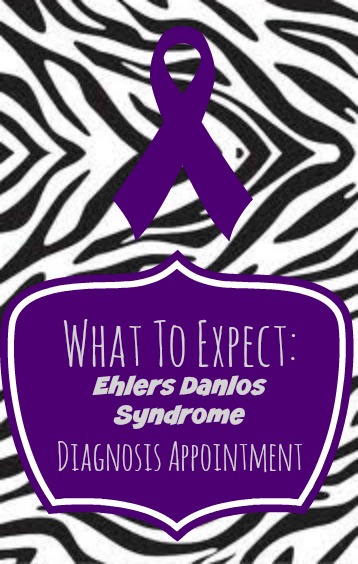
Geneticist Diagnosis For Ehlers Danlos Syndrome – What To Expect
A few years ago I heard that my half-sister had been diagnosed with Ehlers Danlos Snydrome, which is a genetic condition. She believed that it came from our father’s side of the family instead of her mother’s. I did a quick google search and saw that it included symptoms that I had such as “double jointed” fingers and stretchy skin.
I wondered if it was possible that I had the condition, but I was healthy overall and my stretchy skin and “double jointed” hands didn’t cause me any problems so I didn’t seek out a diagnosis.
Back in October I had two tonic clonic seizures (previously called grand mal) and since then I’ve had a handful of different doctors and have been asked more questions about my health than ever before. At some point it was brought up that my sister has been diagnosed with Ehlers danlos syndrome (EDS) and that I showed symptoms. My primary care doctor said she had heard of EDS but couldn’t recall the details of it offhand so she had me set up an appointment for a few days later so she could research it.
When I went in for that appointment she had me run through the Beightson scale test and she thought I was an 8 out of 9 so she referred me to a geneticist at the university of Michigan in Ann Arbor. My appointment was with Dr. Stern.
I had no idea what to expect from the EDS geneticist appointment. I read online that it would mainly be about diagnosing me and not treating. I was mailed a big questionnaire packet that asked about my health history and details about my family members’ health conditions as well.
During my appointment with Dr Stern he started off by showing me a family tree that included health conditions that I listed for each member. He mainly had me verify that everything listed was accurate and he asked a few questions as well. For example, my grandma had cervical cancer and lung cancer and he was curious if the lung cancer resulted after the cervical cancer or if they were separate from each other. He asked if I knew details about the type of EDS that my sister had (I didn’t really know anything other than she was diagnosed with EDS by a geneticist).
After we went over the family details he asked me about my own health history including asking about my pain level, whether I had experienced dislocations or subluxations, how my body handles bruises and scaring.
Once that was over he gave me a hospital gown to put on. When he came back into the room he thumped around on my back, felt my chest, looked over my legs, teeth, mouth and tongue. He turned the lights off and looked into my eyes with a light. He gave me a blanket to put over my legs, and then asked me to raise the hospital gown up under my chest to bare my stomach while he pushed on various spots. Then he went through the beighton scale “test” with me – having me bend back each pinky, put each thumb to my wrist, hold my arms out straight, stand up (to check my knees) and then he had me bend over and touch the floor with my hands flat on the floor. When I bent over he also checked my back for signs of scoliosis.
Once he was finished he had me change back into my regular clothes. When he came back in he explained that I scored a 5/9 (one point for each pinky, one for each thumb and one for putting my hands flat on the ground without bending my knees). Based on the 5/9 score he said he believed I had EDS and because I didn’t show any signs of classical or vascular types that he felt it was type 3 or hypermobile type.
He gave me some papers with recommended books and websites to check out with more information about EDS and the appointment was over.
I didn’t get any referrals or recommended for any additional testing, though I’ve read that most people are told to have heart-related tests done. Most days I am pain free which is rare for EDS so I assume that is the main reason why I wasn’t referred elsewhere.
I’m sure other geneticists may do things slightly differently, and Dr Stern may have had me do other things if I had other symptoms, but I thought I would share my experience because I wanted to know what to expect at my EDS geneticist appointment before I went and wasn’t able to find very many detailed experiences on the net.
If you’ve seen a geneticist for EDS testing let me know in the comments below how yours was similar or different from my visit.


I think mine was similar, except I came into it differently. We already knew I had a collagen problem going in, so time was spent discussing the amount of joint damage per the orthopedic I have and the extent of my arterial bleeds. They set me up with some genetic tests as I have had arterial rupturing and joint hemathrosis. I am not finding a family link to it at all?? I was a 7/9. Not even sure what that means. I go back to the geneticist after the tests, so I am not sure they will refer me to anyone.
My visit was similar, except that I have many more symptoms than you do, and had been getting misdiagnosed for years. My current primary doc committed to helping me find out exactly what we were dealing with, and when I called several years strafe I started seeing him to ask if I could have EDS (after reading about it online), he thought it was likely (he has seen another patient with a slightly different form than mine so I thin he gave himself a mental forehead slap) and made the appointment with the specialist immediately. About half of my appointment was with the assistant, a wonderful woman with a degree specializing in genetic counseling. She asked me tons of questions and let me tell my story in my own way; then wrote down the medically important points. When the doctor came in she had a very good description of my symptoms, history, and treatment from this discussion, and I’d been allowed to see it and make comments or ask for adjustments so that it was complete.
He did the basic Beighton test, looked at skin, any issues that I specifically brought up (old injuries, odd things I’d noticed, etc), and as he is also professor, he asked permission to take pictures of some of my classic symptoms (hand flexibility, for example, and the difficulties I’m having with my teeth) to share with his classes. His office has been wonderful – I can still contact them with questions or to get referrals, and finally having a diagnosis (EDS type 3/hypermobility) that actually makes sense has allowed the rest of my doctors (and dentists) to make the best decisions in treating me!
That’s awesome that the “label” has helped you with other doctors and that the geneticist office has been helpful for you. Do you mind sharing what types of issues you have with your teeth as a result of EDS? I’ve heard people say it can cause issues with teeth but I’ve never heard it explained in detail. The side of my family that the EDS comes from has a lot of dental issues which i’m curious is just chance or related to EDS somehow.
We just had our daughter diagnosed this year after 5 years of getting tossed around. She is now 14. Her teeth are “soft” and she gets cavities easily so they added a prescription enamel hardener to our arsenal. She is Type 3, our issue is controlling the pain.
I was 38 when I got diagnosed. They had an idea of a diagnosis with my first trip to the geneticist. I had typed out a page long list of issues I had been dealing with for the last 12 months and given to my new primary care physician. She checked out her own theories and then thought my eyes had a bluish ting to them. They ran blood work at the geneticist and then 3 months later I went back for results. But I was a 9/9 on the Beighton. They checked the degree of bendiness on my elbows and knees. They measured the side of my head around, the length of my ears, stuff that seems really odd to me. But my blood work came back inconclusive but they said that I have EDS purely from a clinical standpoint. Then last year it was agreed on with a second geneticist.
I was just googling about my skin being stretchy out of the blue as my friends frequently mock me and reading your blog it was like I was reading my own description ( easily bruised, joints too flexible, unbelievably silky hair, very soft nails easily broken by fingers, skin softer than even girls…). I just diagnosed myself with EDS today.
Thanks
The diagnostic critical for all types of EDS (there are 13 different types) has changed a bit. If you go to ehlers-danlos.org you can find lots of info. I was diagnosed as a child in the 70’s after going through developmental motor skills much later and with more difficulty than the “normal”. I also had dislocated knee caps and fingers, sprained and rolled both ankle numerous times. I remember going through the Beighton check with the Dr. who basically looked at my joints with wide-eyed wonder, then called the rest of the office staff in to look at me. Sigh….. As I grew older I discovered and dealt wth many more issues caused by EDS, not just joints. Things are so much better now, our knowledge has increased and there are many resources available to help you manage your problems. As for now, my joints don’t have the range of motion they used to, but they are still unstable and now terribly arthritic. If you are hyper mobile remember there is no genetic testing currently for this type, the diagnosis is based on major and minor critical. So impo. to find a Dr. (now geneticists) who can accidentally diagnose since there are many connective tissue disorders with overlapping features and symptoms. Thank for bringing attention to this much misunderstood and psinful disorder.
My 11 year old son was just diagnosed with type 3 last week. He has subloxed both knees on 2 different occasions. We begun strength training this past summer, which seems to help alot. He has done physical therapy after each subloxation. All the doctor recommended was to continue strength training and add some physical therapy back in as well. He goes back to the specialist to be evaluated from their occupational and physical therapists soon.
I self diagnosed myself. Scoliosis, teeth, pots, hyper mobility, renal failure, soft skin, chairi, veins blue, can see them clearly, diverticulitis, IBS, throat closing, I’m not sure what else or how many I have. Lupus, skin cancer, grand mal seizures, ovarian problems. I can go all the way. But ain’t nobody got time for dat! Lol
I diagnosed myself. Scoliosis, fibromyalgia, pots, hyper mobility, Lupus, renal failure, grand mal seizures, insomnia. The list goes on and on. But ain’t nobody got time for that! Lol!!
The reason you want to get your heart checked by a cardiologist every 2-3 years is because it is affects the connective tissue around your heart and can cause serious heart problems or death I was told when we went in for my 3 year old fora heart murmur and she was diagnosed with probable EDS. Since my dad has connective tissue disease and my brother shows all signs of EDS when we go in next near for a new check up I was told to bring video of my brother doing specific tests and they will move it from probable to actual. The velvet skin was the Drs major sign according to him to test but he does have someone who works with him that has EDS so he is more familiar.
I have an appointment with a geneticist tomorrow, and I’m very anxious. This article was helpful. I’ve run out of energy to figure this out. I’ve been in pain for as long as I can remember. It’s been the worst in the last six or seven years. Doctors found Celiacs Disease; managing that helped a lot. A cardiologist recently diagnosed me with P.O.T.S. However, based on my family history and symptoms, I’m almost certain I have E.D.S. as well. Many doctors and mental health professionals have tried to diagnose me as a hypochondriac or a delusional, over-emotional female. If my geneticist appt doesn’t pan out, I don’t know what I’ll do. I am tough. I can handle the pain. What I can’t handle is never being believed or taken seriously. It’s dehumanizing. Hellish. That’s why I really need to know what’s going on– without a doubt. I’m glad you were able to find a diagnosis, and I wish you the best of luck. Thanks for writing this article so I have an idea of what to expect. – K
My EDS appointment with the geneticist was pretty much the same. I was pretty disappointed as I felt like a lone island… I found my GP was very helpful. I had to do alot of self advocation…. On their own, each symptom can seem very random, but all gathered together they make much more sense! Self advocation is key and so important!